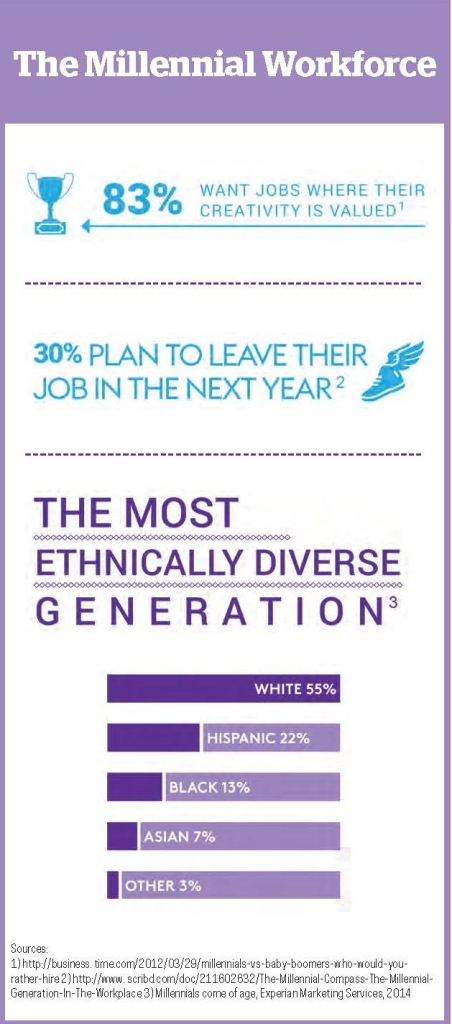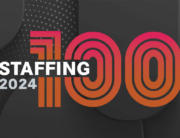They are the largest, most diverse and most educated generation in US history. They grew up fluent in technology that older workers have had to work to adopt. And today, they are changing the way employers think about hiring, training and management.
 Jim Lanzalotto, senior vice president of staffing and healthcare for Monster Worldwide, understands Generation Y or Millennials, as they are often called. He offers insights into how they think about work, what motivates them and how they define success.
Jim Lanzalotto, senior vice president of staffing and healthcare for Monster Worldwide, understands Generation Y or Millennials, as they are often called. He offers insights into how they think about work, what motivates them and how they define success.
Q: Who are Millennials, and why should employers care?
A: Millennials are the generation born between 1982 and 1998. With the shortage of workers that will be coming when the Baby Boomers retire, this group will become incredibly important. You need to think about Millennials differently: They are unique, and their needs are unique. They want to be in a much more engaged working environment.
How significant are Millennials in the workplace?
They make up the largest portion of the workforce. In 2010, Millennials made up 36% of the workforce. In 2015, it was 45%. By contrast, Generation X was 21% in 2015 and the Baby Boomers 31%.
Millennials are more unique than any other group of workers in American history. They have a different set of needs and require a different level of engagement.
It’s also the most ethnically diverse generation of all time: Baby Boomers are 73% white, while the Millennial generation is 55% white.
How do managers view Millennials in the workforce, and how does this contrast with how Millennials view themselves?
We’ve learned that managers have assumptions about Millennials that the Millennials don’t have of themselves.
For example, 90% of managers believe that Millennials are open to change, but only 72% of Millennials say they are. In addition, 68% of managers think Millennials are confident, but only 46% of Millennials believe that they themselves are confident. And 87% of managers think that Millennials are creative, but only 66% of Millennials agree with that.
The assumption is that these folks are dynamic, swaggering all through their work, but that is not something those of the generation believe. Partly because the managers may be a generation or half a generation removed from the Millennials. They may be looking at some behavior and saying, “That’s not something I would have done at that age – I wouldn’t have been that bold or aggressive.”
What motivates Millennials in the workforce?
There are a couple of things that really drive them. Spoiler alert: It’s not money. They are driven to do something they love. This personal development outranks salaries and big bonuses.
Almost two-thirds of Millennials said they would rather make $40,000 at a job they love than $100,000 at a job they think is boring. Personal development is the most influential piece.
How do Millennials consume media, and how is that different than other generations?
The average millennial devotes 5.4 hours a day to social media. They check their smart phones 43 times a day. They consume 18 hours of media per day – a lot of that is multitasking, where they may be watching a YouTube video while they’re on Pinterest.
They don’t watch shows live. They stream, and they go back and watch things in a DVR environment. So if you’re an advertiser, how are you going to reach them? At Monster, our job is to attract job seekers and candidates — we focus on places where we can find these workers. Social media is a top priority for us, as are search and other digital media where people are spending their time.
We used to watch tv shows live and in full (there were no other options) — now, Millennials are waiting for the next day and watching the five minutes that they want to see. And how many folks do you see in the workforce who are plugged in and listening to music while working? It’s a different way of working.
Any advice on attracting and retaining Millennials?
Most workers today prefer an environment where they have the opportunity to be creative and collaborative environment. This is not just working on teams, but working in a place where people want to work together to be successful.
They want a flexible work environment – and what’s flexible to you may be different than what’s flexible to me.
For some people it’s working from home one day a week; for others, it’s the “no vacation” policy where I can take time off as I need it. They really want their career to be one of choice, not of desperation, and to make sure their career choice aligns with who they are as a person.
Most Millennials I’ve spoken to want success. Is success equivalent to salary?
It’s being proud of what they do, working for a company that they are proud of and being in an environment where they enjoy the work and the people with whom they work. Together, that means success. Money does matter, to an extent, but it’s not the only factor for this generation.
What do Millennials expect in terms of the hiring and employment process?
At the end of the day they will make the choice of where they want to work based on culture, challenge and who they want to work with. The average worker stays at a job for 4.4 years, but 91% of Millennials expect to stay at their job for less than 3 years.
Your priority should be to engage Gen Y in ways that will maximize their value to your organization. That could mean assigning a project that engages them mentally and emotionally, or it could mean allowing them to feel in control of their future at your organization. If they can take initiative and create something on their own, they’ll be more productive and more valuable to everybody.
Finally, as with many employees, they will want feedback on a regular basis. My recommendation is to put together a mentoring program with senior and junior staff to help bridge the knowledge and experience gap.







